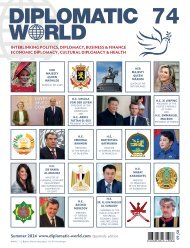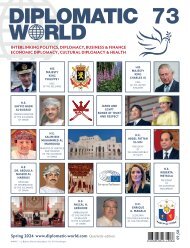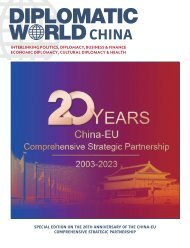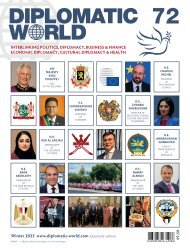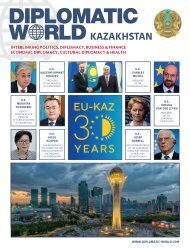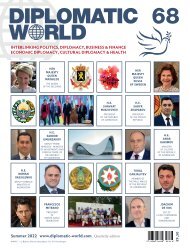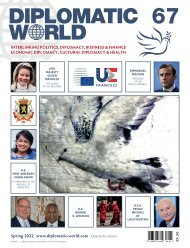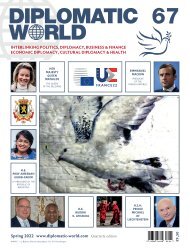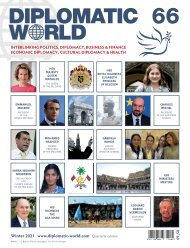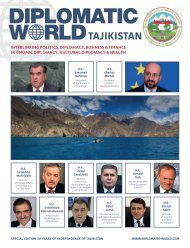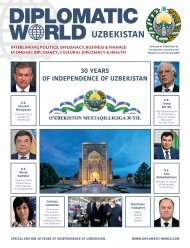Diplomatic World_69
You also want an ePaper? Increase the reach of your titles
YUMPU automatically turns print PDFs into web optimized ePapers that Google loves.
HER HIGHNESS<br />
SHEIKHA INTISAR AL SABAH<br />
OF KUWAIT<br />
I am a firm believer that empowering Arab women<br />
impacted by the brutality of war and violence<br />
can transform them into the<br />
Arab world’s most impactful peacemakers<br />
LIKE QUEEN MATHILDE OF BELGIUM, YOU ARE<br />
A FIRM BELIEVER IN THE POWER OF MENTAL<br />
HEALTH, ESPECIALLY DURING TIMES OF GLOBAL<br />
CRISIS. HOW CAN MENTAL HEALTH CONTRIBUTE<br />
TO A SOCIETY’S WELL-BEING AND THE QUEST<br />
FOR PEACE?<br />
My contributions to the field of peacebuilding are strongly<br />
embodied in the Intisar Foundation, a UK-registered humanitarian<br />
organisation and the first charitable organisation to provide<br />
psychological support programmes of drama therapy to Arab<br />
women impacted by the brutality of war and violence.<br />
In 2017, in collaboration with the International Committee of the<br />
Red Cross (ICRC), and in the presence of the Vice-President<br />
Christine Beerli, I organised a roundtable and art exhibition<br />
entitled “Women in War”, to highlight the challenges faced by<br />
women in war-torn areas. The roundtable inspired 24 artists to<br />
collaborate on a book “Women in War”, but it was also then that<br />
I learned, to my dismay, that no mental health support was being<br />
offered to Arab women affected by war and violence, and thus<br />
I choose to do something about it.<br />
Officially registered as a humanitarian organisation with the<br />
Charity Commission for England and Wales on March 8, 2019,<br />
marking International Women’s Day, Intisar Foundation is a<br />
private initiative born from my determination to find and implement<br />
the most effective psychological approach for alleviating<br />
trauma in these Arab women.<br />
And now, there are many important facts and insights to share<br />
when answering your question about how mental health contributes<br />
to a society’s well-being and the quest for peace.<br />
Firstly, one of our current research projects analyses how<br />
tackling the psychological impact of trauma on women affected<br />
by war leads to their lower levels of aggression and higher<br />
impulse control at home. It then reduces the danger of these<br />
women maltreating their children, and consequently, reduces the<br />
children developing any maladaptive behaviours that might lead<br />
to violence in the future. In this way, where there was conflict, we<br />
manage to raise peaceful children.<br />
To ensure the effectiveness of our work, we always conduct<br />
studies and surveys to measure the impact of our work. A<br />
pilot study we conducted among Lebanese, Syrian, and<br />
Palestinian women after our drama therapy programme in the<br />
Shatila Refugee Camp in Beirut, Lebanon, has revealed that<br />
68.75 percent of participants experienced reduction in posttraumatic<br />
stress disorder (PTSD), 93.75 percent in depression,<br />
75 percent in anxiety, while 78 percent experienced increased<br />
self-esteem, 43.75 percent increased satisfaction in life, and<br />
75 percent stated experiencing increasing positive emotional<br />
experiences and decreasing negative emotional experiences.<br />
Without a doubt, drama therapy is an effective and efficient<br />
approach to mental health issues caused by war and violence.<br />
Plus, another outcome of drama therapy reducing PTSD<br />
symptoms, such as aggression and low-impulse control, is the<br />
reduction of household violence either directly from the mother or<br />
indirectly through the reduction of tensions within the household<br />
and facilitating better emotional growth and communication within<br />
the family. The anticipated long-term effects of this are better<br />
social integration for the family, a decreased likelihood of school<br />
dropout rates and risks leading to criminal, violent or extremism.<br />
Women play a huge role in maintaining the cohesion of their families<br />
and nurturing the emotional needs of their children. Through<br />
the foundation’s work, it was observed how when the matriarchal<br />
figure in a given family is given support and care by a greater<br />
community around her, she flourishes and imparts those benefits<br />
on her children, husband, parents, and community. On average,<br />
for every woman that Intisar Foundation reaches, between 6 and<br />
10 indirect beneficiaries are also reached. By helping one woman<br />
Her Highness Sheikha Intisar Al Sabah of Kuwait<br />
become more resilient, accepting, and at Peace with herself,<br />
conflict of all kinds as they are often the most badly affected<br />
we will also be helping those around her prosper and grow like and least likely to be the perpetrators of violence, BUT (2) Arab<br />
she has.<br />
women particularly often face impenetrable cultural, social, and<br />
language barriers which prevent them from attending psychological<br />
care services.<br />
Even more importantly, Intisar Foundation’s work has shown<br />
evidence of changing deeply entrenched cultural narratives,<br />
such as Arab women ending the practice of child marriages due For instance, while Lebanon and Jordan have the highest refugee<br />
to a newly-adopted belief that they can protect their daughters population per capita in the world, with 156 and 72 per 1,000<br />
by encouraging them to gain education and hoping for their<br />
residents respectively, some data suggest that not so long ago<br />
future economic empowerment, as opposed to marrying them there were only 1.1 psychiatrists per 100,000 residents of Jordan,<br />
off. The foundation’s team also reports the cases of female<br />
and only 1.2 psychiatrists per 100,000 residents of Lebanon.<br />
victims of domestic violence standing up to their abusers.<br />
The implications that a lack of timely and adequate mental health<br />
Secondly, our focus on Arab women affected by war and violence<br />
rests upon my realisation that (1) women in general are<br />
also affect their children and families. And this is why I founded<br />
care can have on their psychological well-being can be huge and<br />
more vulnerable to the psychological impact of war and violent Intisar Foundation.<br />
16 17




